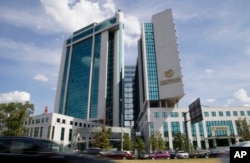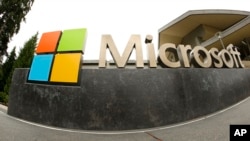Russian users of the online professional-social network LinkedIn expressed concern after Russian authorities this week began blocking the popular service.
LinkedIn has around six million registered users in Russia. As Russia’s economy shrank from low oil prices and sanctions, business networks like LinkedIn have become increasingly important to Russian job-seekers and employers.
Employment affected
Russian companies, including state-owned Sberbank, have expressed concern that blocking LinkedIn will make it harder to recruit the right employees.
“LinkedIn quite affected us,” said employment service Vital Partners managing partner Ekaterina Gronskaya as she lamented the restriction. “We have got no Russian equivalent. And we started facing difficulties in looking for top experts. We are stuck now when looking for experienced and successful managers. It was a proper resource of contacts. Some of them might now be lost.”
Russia’s communications watchdog Roskomnadzor on Thursday ordered internet providers to cut access to the site for failing to abide by a controversial data storage law that came into force a year ago.
A Moscow court last week said LinkedIn violated the law’s requirement for internet companies to keep their servers with Russian citizens’ personal data on Russian soil.
LinkedIn has requested to meet with Roskomnadzor to discuss the situation.
Internet companies under pressure
This is the first time Russian authorities enforced the law, raising concerns that other popular online services such as Facebook, Google, or Twitter could be next.
The U.S. Embassy in Moscow expressed deep concern about the block, urged Russian authorities to restore access to LinkedIn, and said the restrictions harmed competition and the Russian people. "This decision is the first of its kind and sets a troubling precedent that could be used to justify shutting down any website that contains Russian user data,” said spokesman Maria Olsen in a statement given to various media.
While Russian internet companies were quick to comply with the law, foreign ones have resisted because of the additional costs and concerns about privacy.
Privacy concerns
Russian authorities say keeping its citizens’ personal data on servers in Russia would protect it from foreign spying and strengthen national security. But, critics say it just makes it easier for Russia to spy on its own people.
“It has nothing do to with privacy concerns,” said Andrei Soldatov, co-author of The Red Web: The Struggle Between Russia’s Digital Dictators and the New Online Revolutionaries. “It’s all about how to make global companies domestic, how to land them effectively in Russia and Russian jurisdiction, and to make their data accessible to the Russian secret services,” he comments via Facebook Messenger.
In the case of LinkedIn, privacy may not be the main concern as its service involves exchanging detailed resumes and contact information.
“Considering the nature of this service I'd assume that personal privacy isn't the most important issue for most of the users when they're looking for job(s),” Daniil Grigoryev, an expert from the Institute of Globalization and Social Movements said in e-mailed comments.
Analysts say Russian authorities went after LinkedIn, a relatively small player in Russia, to give notice to bigger internet companies with more important data.
“I think it's a game and Roskomnadzor believe they are in strong position given their good relationship with Microsoft and that the company is due to be acquired by Microsoft,” said Soldatov. “However, I'm not so sure that LinkedIn is ready to relocate its servers.”
Nationalizing the internet
Some have suggested Russia wants to nationalize the internet by pushing out big players like Microsoft.
Russian President Vladimir Putin wants to replace all foreign computer software in Russian government offices and state-owned enterprises with Russian software. The efforts, already begun in Moscow’s city government, underscore concerns about security.
But, analysts pour cold water on the notion that relatively new Russian software could replace well-known foreign brands any time soon.
“One of the most important reasons here, participating in various ‘patriotic’ campaigns, is an easy way to get sufficient budget funding, no matter how shady the actual implications of those ideas would turn out to be,” said Grigoryev.
A number of lawsuits are pending involving foreign internet companies.
Russia’s Federal Anti-Monopoly Service (FAS) is suing Microsoft after a complaint by Russian cyber security firm Kaspersky Labs. Kaspersky said Microsoft used its market-dominating Windows operating systems to create preference for Microsoft’s built-in anti-virus software over others.
Google on Friday filed a new lawsuit against the FAS over fines the company was ordered to pay last year for allegedly restricting installation of applications by other developers on its Android operating system. The regulator had ordered Google to allow Android phone makers to offer a Russian search engine.
Hacking attacks
Microsoft and LinkedIn have been targeted by Russian hackers, including those linked to the Russian state.
Microsoft earlier this month blamed hackers linked to Russian authorities for exploiting a security flaw in its Windows operating system. Cyber security experts say the hackers have connections to Russian intelligence and are part of the same group responsible for attacks this year on the U.S. Democratic Party.
In October, the U.S. Federal Bureau of Investigation arrested a Russian citizen in Prague who was indicted for hacking LinkedIn, Dropbox and a chatting service called Formspring. LinkedIn in May revealed that 117 million login names and passwords were stolen in the 2012 attack.
China model?
Soldatov said the efforts, including against LinkedIn, show Russia is trying to move toward China’s model of controlling information online. But, he does not believe determined Russian users will really suffer.
“Russia skyrocketed to second position in the number of users of the Tor network in November 2015, after Roskomnadzor blocked Rutracker, so now many users know how to use circumvention tools.”
Analysts note unlike China’s early established internet controls, Russia has been struggling to catch up and has much less censorship online. Consequently, official Russian efforts to control online information look awkward and get a lot more negative reaction.
Making waves of publicity may be the goal, said Grigoryev. “Despite it's ambitious and sometimes hostile slogans, Russia has no real intentions, let alone a properly functioning government, to make all those claims come true. Like most parts of grand national projects, an image in the media and political speeches are way more important than the real implementation.”






